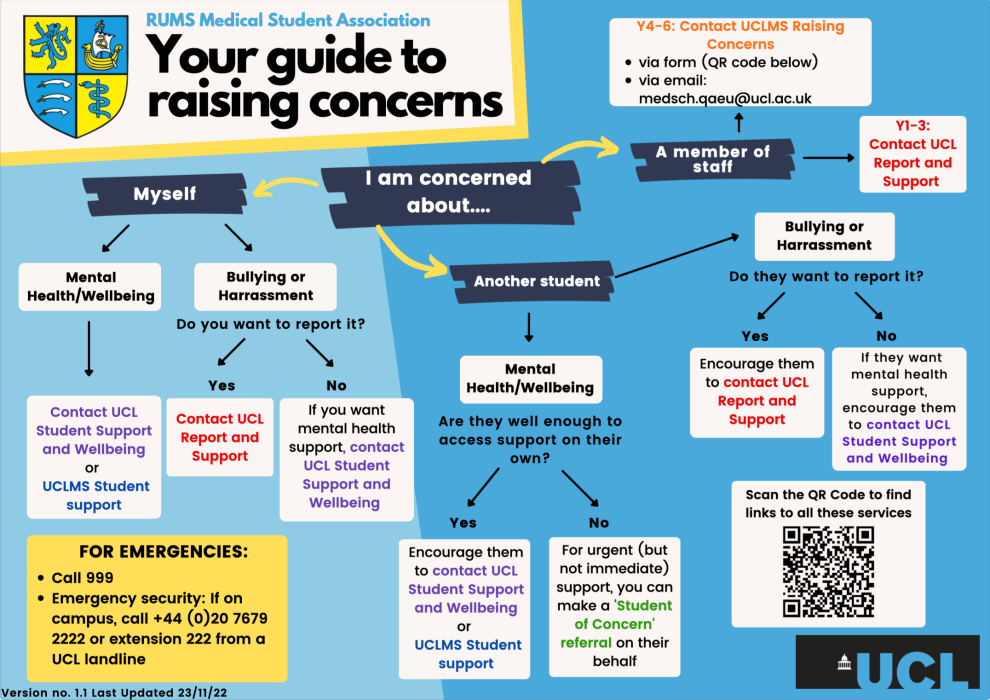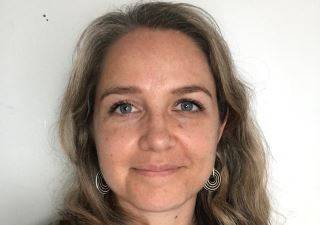'Raising Concerns' is the UCL MBBS portal where Y4-6 medical students can report a concern involving members of faculty or clinicians affiliated with UCL Medical School.
The Quality Assurance and Enhancement Unit (QAEU) are committed to protecting the welfare of our students and facilitating resolutions, where appropriate, for all parties involved. We know this process can be daunting, therefore we have compiled a list of FAQs below. If you are unsure about the reporting process or whether you should submit a concern, we are happy to have an informal chat with you about your situation, online or face to face. You can book a 30 minute chat (either on Teams or in-person) with our QAE Associate Lecturer Vicki via this Calendly link or email us at medsch.qaeu@ucl.ac.uk.
There are 3 different reporting platforms at UCLMS:
- Concerns relating to other students should be raised with UCLMS Student Support services.
- Concerns relating to years 1-3 should be raised with UCL's 'Report + Support' platform
- Concerns relating to years 4-6 should come to Raising Concerns and you can submit a report by completing the Raising Concerns Form.
The RUMS Team have created the flowchart below to help you navigate different situations:

Many students feel unclear about what happens after a concern is raised and there is more information in the FAQ below. There are also case studies available to help demonstrate the process - see Harshil, Michelle, Ali & Sarah's stories. If you have any questions reach out to us: medsch.qaeu@ucl.ac.uk
Additional information can be found in our guidance document: Raising Concerns 2024
What happens after a concern is raised?:
- The QAEU reviews the concern
- We reach out to the reporting party to:
- get more context if needed
- check they are getting the right support
- discuss how best we should take the concern forward
- Each concern is different but in general we pass anonymised information to the relevant site to investigate and and resolve
Frequently Asked Questions (FAQs)
- Who are the QAEU and are they part of the Medical School?
- Will information about my report ever be shared with faculty within the medical school?
- Should I report this?
- What happens when I report a concern?
- Should I submit an anonymous report?
- Can I raise a concern through UCL's Report + Support platform?
- Does the QAEU work with student representatives?
- What if I am unhappy with the outcome?
- Who are the Freedom to Speak Up Guardians?
Who are the QAEU and are they part of the Medical School?
We co-ordinate responses to concerns raised by students with the aim of achieving mediation where appropriate. We can be reached at medsch.qaeu@ucl.ac.uk.
| Mr John Hines - QAE Academic Lead | Dr Vicki Cowling - QAE Associate Lecturer (Teaching) | Michelle Galloway - QAE Coordinator | Izzie Jay - QAE and CPP Manager |
|---|---|---|---|
|  |  |  |
We are a part of the Medical School but we keep details of concerns confidential and within the QAEU. Any sharing of information outside of the QAEU would only be done with the explicit consent of the Reporting Party or in the event of a safeguarding concern (please see further information on this below).
Key People
| Senior Leadership Team | |
| Director of UCL Medical School | Professor Faye Gishen |
| Deputy Lead for MBBS Programme (Years 1-3) | Dr Sarah Bennett |
| Deputy Lead for MBBS Programme (Years 4-6) | Dr Aroon Lal |
| Divisional Tutor | Dr Will Coppola |
| Deputy Divisional Tutor | Miss Stella Ivaz |
| MBBS Management Team | |
| MBBS Divisional Manager | Mrs Sam Photiades |
| Head of MBBS Management | Ms Gaynor Jones |
| HR Business Partner | |
| Faculty of Medical Sciences | Ms Connie Thrower |
Will information about my report ever be shared?
The specific details of the report and your personal information is kept on file and can only be accessed by the QAEU. However, as part of the 'Raising Concerns' process, we may need to share specific information with the relevant parties but we would always discuss and agree this with you first. Reports relating to peer-on-peer incidents are managed specifically by the MBBS Student Support team.
There are some situations where the right to confidentiality would be waived. These include any safeguarding issues involving other students or if there are concerns regarding your own mental or physical wellbeing. We would always aim to make this clear to you and ensure that you have access to additional support, which may include a referral to the UCL Student Support & Wellbeing team.
Any concerns raised, formally or informally, meeting the threshold of criminal activity will be automatically escalated to the relevant bodies.
Should I report this?
Sometimes it can be difficult to know if what you have experienced or witnessed should, or needs to be reported to the QAEU. We also know that some of you may be concerned about how the process may impact your studies and we recommend that you initially speak to someone you trust.
The first disclosure is often most difficult, therefore we have listed below some examples of people who are best placed to support you.
- Your CPP and personal tutors
- Specialty and year leads
- EDI Committee members
At the QAEU, we are always happy to provide this initial advice and support, even if you decide not to submit a formal report.
What happens when I complete the 'Raising Concern' Form?
The QAEU are responsible for monitoring the online portal. Reports can be submitted either anonymously or non-anonymously.
For reports raised non-anonymously, we would always meet with you first to discuss the concern and this can be done either remotely or face-to-face. This allows us to discuss next steps and whether you wish to proceed with a formal report, or not. The QAEU will support you to make an informed decision however you wish to proceed.
If you decide to proceed with a formal report, we follow an established protocol depending on the nature of the report.
- If the concern relates to an incident in a clinical setting, the specialty and site leads would be responsible for managing the report. Student would be provided with feedback by the QAEU but this would be limited to ensure the Responding Party's right to confidentiality.
- If the concern relates to a member of faculty this would be escalated in accordance with UCL HR policies.
If you choose to submit your report anonymously, this will be logged but you will not receive any contact from the QAEU. We are not able to track who has submitted an anonymous report.
Below you can find additional information on our case studies of concerns that we have managed.
Should I submit an anonymous report?
We take all reports seriously, regardless of whether they are submitted anonymously or not.
In line with UCL's Public Interest Disclosure policy, students are encouraged to include their name on the 'Raising Concerns' report, although we recognise that many of you will remain cautious about doing so.
All concerns raised through the reporting form are re-assigned unique IDs to prevent your anonymity being compromised and any identifying information would only be disclosed in the event that it is relevant and on a strict "need-to-know" basis.
While we cannot give individual feedback and explore what action has been taken for anonymous reports, they do enable us to monitor patterns of behaviour and practice. This is vital in guiding us on other areas of work we are involved in, principally the implementation of staff teaching and training activities.
When dealing with anonymous complaints it can be harder to ensure the reporting party isn’t accidentally revealed during our follow up. For some, students ask us to wait until they rotate placements or if other staff were present we can de-identify the fact the concern was raised by a student and only that it was raised by a witness.
Can I raise a concern through UCL's 'Report + Support' platform?
Yes. UCL's 'Report + Support' is the central platform for all UCL students and we recognise that some students may feel more comfortable using this rather than the dedicated platform at the Medical School. They follow the same set of protocols and would only pass on your details to us with your consent.
Please note that UCL 'Report + Support' is only able to deal with concerns raised around UCL staff and where concerns are raised about clinicians on site, they would pass these details onto to the QAEU.
As part of UCL's efforts to track incidents of bullying, harassment and sexual misconduct, the QAEU share anonymised data and meet twice a year with UCL to share and discuss the reports we receive. This does not include any specific or personal details but this data is used to support the development of wider interventions and strategies at UCL.
Does the QAEU work with the student representatives?
We know that many students may not wish to speak with us directly and therefore we work closely with student representatives to discuss any ongoing issues. No identifiable details would ever be shared without your consent.
What happens if I am unhappy with the outcome?
The QAEU aim to facilitate your concerns toward an appropriate outcome for both parties. If you are unhappy with the outcome then we would look to involve the UCL Student Mediator or, for clinical placements, the site's Medical Director.
Who are the Freedom to Speak Up Guardians?
Each of UCLMS' partner Trusts has a 'Freedom to Speak Up (FTSU) Guardian' who supports Trust employees to speak up when they have a concern. These Trust-based FTSU Guardians are ideally placed to discuss concerns with UCLMS students and encourage them to report their concerns to the Medical School via the online portal.
The National FTSU Guardian's Office, in association with Health Education England (Now NHS England), has developed an e-learning package: 'Speak Up, Listen Up, Follow Up', which aims to explain in a clear and consistent way what speaking up is and its importance.
The first module aims to help everyone working in healthcare to understand what speaking up is, how to speak up and what to expect when they do.
Year 4-6 students are recommended to undertake the module, which can be accessed via NHS England's e-learning for Healthcare, to ensure they are familiar with how to speak up in their clinical placements, if required.
 Close
Close


